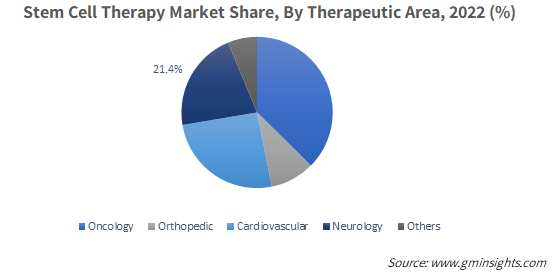Home > Healthcare > Biotechnology > Biopharma > Stem Cell Therapy Market
Stem Cell Therapy Market Analysis
- Report ID: GMI3331
- Published Date: Feb 2023
- Report Format: PDF
Stem Cell Therapy Market Analysis
Based on therapeutic area, stem cell therapy market from orthopedic segment is expected to grow at over 9.5% CAGR from 2023 to 2032, fueled by the surging occurrence of orthopedic ailments among the elderly population. Therapeutic or treatment procedures that incorporate stem cells are believed to have the potential to facilitate faster healing of bone and cartilage defects. These regenerative therapies work for various orthopedic complications such as osteoarthritis, focal and cartilage damage among others, and effectively eliminate the need for invasive surgeries where the geriatric population have a historically low success and survival rate.
In terms of end use, stem cell therapy market size from hospitals segment held a valuation of over USD 6.5 billion in 2022, supported primarily by growing government focus on healthcare infrastructure upgradation efforts. In October 2022, for instance, the US government announced an investment of around USD 110 million to improve access to healthcare in rural areas. A majority of the proposed capital would be going towards the construction of new hospitals. Numerous academic and research institute-affiliated hospitals aid R&D initiatives that advance the field of stem cell therapy further. The connection with such institutes helps hospitals advance stem cell treatment therapies.

Europe stem cell therapy market valuation is poised to surpass USD 8 billion by 2032, owing to the increasing occurrence of neurodegenerative diseases in the region. Stem cell therapies involving MSCs and iPSCs have been shown to be effective in treating several neurodegenerative diseases such as Alzheimer’s disease (AD), and Parkinson’s disease (PD) among others. As such, many healthcare professionals in Europe are increasingly turning to cellular therapy for treating neurodegenerative ailments such as AD, PD, traumatic brain injury, and other conditions where neurological disabilities cannot be reversed. As per the UK government, over 700,000 people in the UK are suffering from Alzheimer’s disease, which is creating an acute need for cellular therapy.

